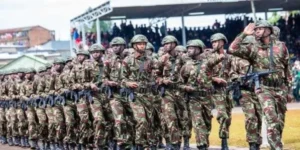Kenya announced a delay in sending 1,000 police officers to Haiti to combat gangs on March 12.
This decision followed a Caribbean Community meeting that resulted in Haitian Prime Minister Ariel Henry stepping down. Kenya’s move highlights the complexities of international security efforts.
Initially, Kenya and Haiti agreed to deploy Kenyan officers to lead a task force against gang violence.
Signed on March 1, this plan faced setbacks from political opposition and gang resistance, ultimately halting with Henry’s resignation.
Kenya stated that it would not proceed without a stable Haitian government. This underscores the importance of political stability for international cooperation.

Violence surged in Haiti on February 29. Gangs attacked police, closed airports and ports, and freed over 4,000 prisoners, showing the severe security challenges Haiti faces.
Henry resigned after being stuck in Puerto Rico, unable to return to Haiti due to gang control.
His visit to Kenya aimed to finalize the police deployment, supported by the UN and US, with a $300 million aid promise to Haiti.
The UN Security Council’s approval of the mission on October 2, 2023, aimed to address Haiti’s dire situation. The country struggles with lawlessness, viewed by many as a failed state.
The killing of President Jovenel Moise in 2021 highlighted Haiti’s insecurity, worsening its crisis.
Nations like Benin, Chad, and Bangladesh pledged support for Haiti. Caribbean leaders sought a transitional council for Haiti’s governance but reached no final plan.
In short, this scenario emphasizes the global effort to restore stability in Haiti, showing how international collaboration is crucial yet dependent on local political contexts.

